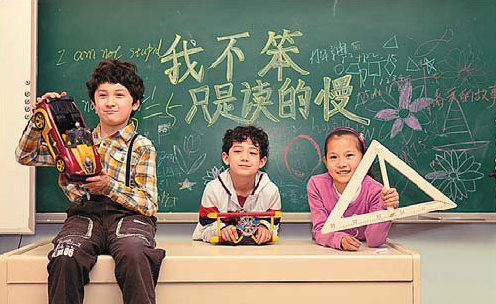Unique calling
Updated: 2013-05-08 05:51
By Xu Lin (China Daily)
|
||||||||

|
Dyslexic children cannot be cured with medicine or surgery. Instead, they can only be helped with special education. Photos provided to China Daily |
People with dyslexia have often been misunderstood. There are now centers in China aimed at creating public awareness and giving training courses to this group of people, Xu Lin finds out.
Wu Xiping, an office worker from Beijing, had been concerned about her 11-year-old son's bad writing until two years ago when she accidentally found out the boy has dyslexia. It is a terminology she has never heard before, neither have many other Chinese parents.
"I felt relieved the moment I found out. At least I know how to help him so that he could have fewer difficulties in the future," she says.
Many people with dyslexia have difficulties reading, writing and spelling. With a neurological origin, dyslexia is not correlated with IQ. There are famous and successful people with dyslexia, such as Leonardo da Vinci and Tom Cruise.
According to the International Dyslexia Association in the United States, about 15 to 20 percent of the population has some symptoms of dyslexia, including slow or inaccurate reading, or mixing up similar words. Anatomical and brain imagery studies show differences in the way those with dyslexia develop and function.
Since Wu's son started primary school, he was slow in his homework and his writing was huge and illegible. The teacher thought he had a lackadaisical attitude and often punished him by asking him to rewrite. As a result, he always slept late.
By chance, Wu saw a media report about dyslexia, and decided to send her son for a test. After the result confirmed her son's problem, she told her son's teacher, who had no idea what dyslexia was.
The founder and president of Langlang Learning Potential Development Center in Beijing, Lan Zi, says: "Early identification and treatment is very important and teachers should modify teaching methods and the educational environment to meet the children's unique needs."
The center offers professional training classes for children below the age of 12 with dyslexia.
Wu sends her son to the center, and he now writes much better and enjoys his training classes. He is happier as the teacher is less strict with his handwriting.
Wu says she can see his improvement every day.
According to Lan, to have a definite diagnosis, one should go through a nuclear magnetic resonance scanning of the brain in the 306 Hospital of the PLA (the only hospital in Beijing offering the diagnosis) or take a test on reading and writing abilities in the center.
"Dyslexia can't be cured with medicine or operation, and can only be corrected with special education," Lan says.
She says children should undergo the right trainings to help them improve reading and writing abilities.
Children below the age of 8 show up to 80 percent improvement after one year's training in the center.
Lan says the progress rate drops gradually as the children become older, to as low as 40 percent at the age of 12. After 12 years old, she advises parents and teachers to allow the children to develop naturally according to their talents.
In Lan's center, children are divided into groups according to their levels and taught by multi-sensory and associative memory. For example, teachers put Chinese character radicals in different colors to help the kids remember.
About one third of the students' families find online about the center.
One third is introduced by parents who send children to the center, and the rest are those who participate in the center's activities.
According to Lan, dyslexia not only affects children's academic life and relationships with families and classmates, but also their psychological health. Some may have a proclivity toward violence and some are self-abased.
She says about 14 percent of her students are receiving psychotherapy at the same time. Some refuse to go to school because they had a hard time there.
"Teachers and parents should acknowledge their difference and not blame the kids for their poor reading and writing abilities. A healthy personality is the most important, and kids should live in a relaxed environment," she says.
Lan used to own a publication company. In 2007, she got to know about dyslexia by accident and started to research about it with the help of an NGO in Hong Kong.
"It was at that time that I realized dyslexia is a serious social problem in China," says Lan, who closed down her company and established Langlang.
In 2007, when she searched the word "dyslexia" on Baidu.com, the largest Chinese search engine, there were about 100 related results. Now there are more than 230,000. As far as she knows, there are about three such centers in China.
She thinks the center's greatest contribution is creating public awareness about dyslexia, and it's also the biggest challenge.
Its public awareness activities include delivering speeches in schools and communities. The Chaoyang district government has also purchased Langlang's training program to help dyslexic children from impoverished families.
During the National People's Congress and Chinese People's Political Consultative Conference in March, a delegate submitted a proposal about the establishment of a national system to identify dyslexia among children and professional training centers.
But there is still a long way to go in China, where dyslexia is still something new to the public.
In Western countries, such as the United States and the United Kingdom, there are policies for those with dyslexia and the members of the public are very familiar with it. The US even has primary schools, middle schools and universities with centers that are exclusively for this group of people.
"It will be a success only when most people know about dyslexia. We need more support and related laws and regulations to help people with dyslexia," she says.
According to Lan, the children are no different from others, and some are genius.
Wu says, "My son may have some difficulties in writing, but has a gift for identifying solid shapes and likes designs very much. I want him to develop what he's good at.
"We need to be patient because it takes time for kids to improve reading and writing abilities. We should understand and tolerate our own children, by appreciating their advantages."
Contact the writer at xulin@chinadaily.com.cn.
(China Daily 05/08/2013 page19)

 Michelle lays roses at site along Berlin Wall
Michelle lays roses at site along Berlin Wall
 Historic space lecture in Tiangong-1 commences
Historic space lecture in Tiangong-1 commences
 'Sopranos' Star James Gandolfini dead at 51
'Sopranos' Star James Gandolfini dead at 51
 UN: Number of refugees hits 18-year high
UN: Number of refugees hits 18-year high
 Slide: Jet exercises from aircraft carrier
Slide: Jet exercises from aircraft carrier
 Talks establish fishery hotline
Talks establish fishery hotline
 Foreign buyers eye Chinese drones
Foreign buyers eye Chinese drones
 UN chief hails China's peacekeepers
UN chief hails China's peacekeepers
Most Viewed
Editor's Picks

|

|

|

|

|

|
Today's Top News
Shenzhou X astronaut gives lecture today
US told to reassess duties on Chinese paper
Chinese seek greater share of satellite market
Russia rejects Obama's nuke cut proposal
US immigration bill sees Senate breakthrough
Brazilian cities revoke fare hikes
Moody's warns on China's local govt debt
Air quality in major cities drops in May
US Weekly

|

|








